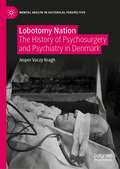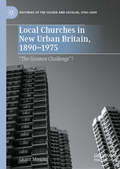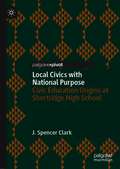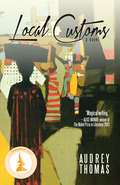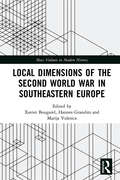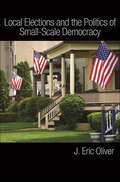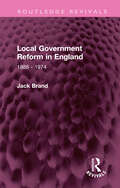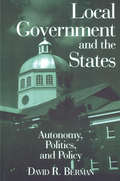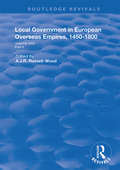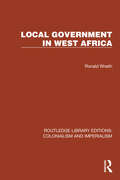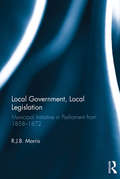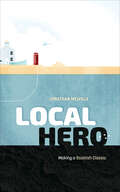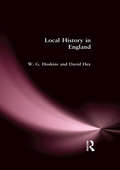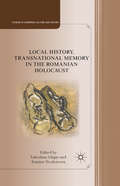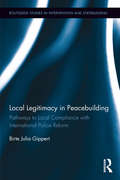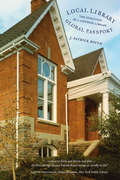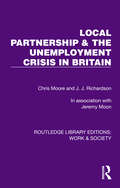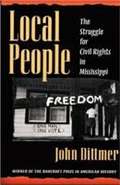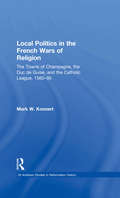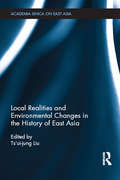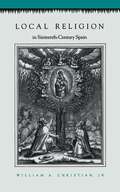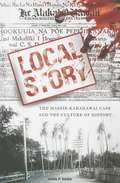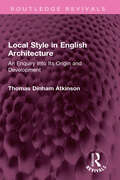- Table View
- List View
Lobotomy Nation: The History of Psychosurgery and Psychiatry in Denmark (Mental Health in Historical Perspective)
by Jesper Vaczy KraghThis book tells the story of one of medicine’s most (in)famous treatments: the neurosurgical operation commonly known as lobotomy. Invented by Portuguese neurologist Egas Moniz in 1935, lobotomy or psychosurgery became widely used in a number of countries, including Denmark, where the treatment had a major breakthrough. In fact, evidence suggests that more lobotomies were performed in Denmark than any other country. However, the reason behind this unofficial world record has not yet been fully understood. Lobotomy Nation traces the history of psychosurgery and its ties to other psychiatric treatments such as malaria fever therapy, Cardiazol shock and insulin coma therapy, but it also situates lobotomy within a broader context. The book argues that the rise and fall of lobotomy is not just a story about psychiatry, it is also about society, culture and interventions towards vulnerable groups in the 20th century.
Local Churches in New Urban Britain, 1890-1975: “The Greatest Challenge”? (Histories of the Sacred and Secular, 1700–2000)
by Grant Masom“This monograph is an important contribution to our understanding of the varied fortunes of British Christianity during the twentieth century.” - Rev Dr Andrew Atherstone, Tutor in Church History and Latimer Research Fellow, Wycliffe Hall, University of Oxford, UK “This book is an important and original work. Anyone interested in twentieth-century Christianity in Britain will learn much from it. Grant Masom enables the reader to make sense of the new urban spaces that became a key part of British life in the last hundred years.” - Rev Dr David Goodhew, Visiting Fellow of St Johns College, Durham University, UK “This ground-breaking study adds new depth to our understanding of the importance of religion in English life and the role of the churches in shaping their own destiny in the first three-quarters of the twentieth century.” - Dr Mark Smith, Associate Professor in History, University of Oxford, UK This book contributes to the ongoing academic debates on secularisation—or the marginalisation of mainstream religious beliefs and practices—in twentieth-century British society. It addresses three areas in which the current literature is weak: the ‘agency’ of organised religion in the outcomes described as secularisation, rather than explanations based on external challenges (such as the ‘modernisation’ of society and thought, increased affluence, and more leisure choices); a focus on urban areas transformed by twentieth-century industrialisation and suburbanisation; and an extended time period to the end of the third quarter of the twentieth century, allowing proper consideration of long-term trends alongside short-term upheavals such as the World Wars, the Great Depression, and the social changes of the 1960s. Further, the book employs a distinctly different, highly data-driven approach, considers all religious movements, and sets its conclusions within the wider social and cultural context of a representative community.
Local Civics with National Purpose: Civic Education Origins at Shortridge High School (Historical Studies in Education)
by J. Spencer ClarkThis book examines the development of civic education in the United States through the lives of two teachers at Shortridge High School (SHS) in Indianapolis around 1900. After situating civic education at the turn-of-the-century, the book describes the career of Laura Donnan—her influences, teaching, extracurriculars, and civic life—through the lens of her unique epistemology, shaped by negotiating the gendered ideologies of her era. Then, the book re-examines Arthur W. Dunn’s career, focusing on his ten years at SHS, and the influence of Donnan on his popular community civics curriculum and subsequently the 1916 report “The Social Studies in Secondary Education.” Previous scholars have overlooked Dunn’s time at SHS, viewing it simply as a stepping stone for the progressive educator’s career. This book argues that Dunn’s time at SHS was pivotal to his career due to influential colleagues, primarily Donnan. To conclude, Clark discusses the implications of Donnan’s epistemology in shaping civic education in the United States.
Local Customs
by Audrey ThomasNominated for the 2016 Forest of Reading Evergreen Award Nominated for the 2014 Victoria Book Prize An Englishwoman’s mysterious death in 19th-century West Africa haunts those left behind. Letitia Landon, "Letty" to her friends, is an intelligent, witty, successful writer, much sought after for dinner parties and soirées in the London of the 1830s. But, still single at thirty-six, she fears ending up as a wizened crone in a dilapidated country cottage, a cat her only companion. Just as she is beginning to believe she will never marry, she meets George Maclean, home on leave from his position as the governor of Cape Coast Castle on the Gold Coast of West Africa. George and Letty marry quietly and set sail for Cape Coast. Eight weeks later she is dead — not from malaria or dysentery or any of the multitude of dangers in her new home, but by her own hand. Or so it would seem. Local Customs examines, in poetic detail, a way of life that has faded into history. It was a time when religious and cultural assimilation in the British colonies gave rise to a new, strange social order. Letty speaks from beyond the grave to let the reader see the world through her eyes and explore the mystery of her death. Was she disturbed enough to kill herself, or was someone — or something — else involved?
Local Dimensions of the Second World War in Southeastern Europe (Mass Violence in Modern History)
by Xavier Bougarel Hannes Grandits Marija VulesicaThis book deals with the Second World War in Southeastern Europe from the perspective of conditions on the ground during the conflict. The focus is on the reshaping of ethnic and religious groups in wartime, on the "top-down" and "bottom-up" dynamics of mass violence, and on the local dimensions of the Holocaust. The approach breaks with the national narratives and "top-down" political and military histories that continue to be the predominant paradigms for the Second World War in this part of Europe.
Local Elections and the Politics of Small-Scale Democracy
by J. Eric OliverLocal government is the hidden leviathan of American politics: it accounts for nearly a tenth of gross domestic product, it collects nearly as much in taxes as the federal government, and its decisions have an enormous impact on Americans' daily lives. Yet political scientists have few explanations for how people vote in local elections, particularly in the smaller cities, towns, and suburbs where most Americans live. Drawing on a wide variety of data sources and case studies, this book offers the first comprehensive analysis of electoral politics in America's municipalities. Arguing that current explanations of voting behavior are ill suited for most local contests, Eric Oliver puts forward a new theory that highlights the crucial differences between local, state, and national democracies. Being small in size, limited in power, and largely unbiased in distributing their resources, local governments are "managerial democracies" with a distinct style of electoral politics. Instead of hinging on the partisanship, ideology, and group appeals that define national and state elections, local elections are based on the custodial performance of civic-oriented leaders and on their personal connections to voters with similarly deep community ties. Explaining not only the dynamics of local elections, Oliver's findings also upend many long-held assumptions about community power and local governance, including the importance of voter turnout and the possibilities for grassroots political change.
Local Government Reform in England: 1888 - 1974 (Routledge Revivals)
by Jack BrandOriginally published in 1974, this study concerns the politics of local government reform between 1942-1974 and describes the struggles between the Ministries, the Local Government Associations and political parties. The political manoeuvrings of the various groups involved are analysed and a theory proposed about the reform of political structures in general.
Local Government and the States: Autonomy, Politics and Policy
by David BermanThis book offers an overview of the legal, political, and broad intergovernmental environment in which relations between local and state units of government take place, the historical roots of the conflict among them, and an analysis of contemporary problems concerning local authority, local revenues, state interventions and takeovers, and the restructuring of local governments. The author pays special attention to local governmental autonomy and the goals and activities of local officials as they seek to secure resources, fend off regulations and interventions, and fight for survival as independent units. He looks at the intergovernmental struggle from the bottom up, but in the process examines a variety of political activities at the state level and the development and effects of several state policies. Berman finds considerable reason to be concerned about the viability and future of meaningful local government.
Local Government in European Overseas Empires, 1450–1800: Part II (Routledge Revivals #23)
by A.J.R. Russell-WoodFirst published in 1999, this volume is an ambitious attempt to provide a wide-ranging introduction to local government in the overseas empires of Portugal, Spain, England and France, with further reference to the English East India Company and the Dutch East and West India Companies. In an exercise in compensatory history, the book examines government of empire not from the metropolitan perspective but at the local level, where government was most likely to impact on the everyday lives of both persons of European birth and indigenous peoples. The first part examines the institutional framework of local and regional government at the municipal, parish and county levels, extending this to include law and order, social welfare and education. The second part examines the social dimension of local government: governance in pluricultural societies; elite formation; creolization; representation and oligarchies; oversight, and negotiated authority. The work includes a comprehensive introduction, together with an extensive bibliography and a detailed index.
Local Government in West Africa (Routledge Library Editions: Colonialism and Imperialism #36)
by Ronald WraithLocal Government in West Africa (1964) examines colonial and independent local government in Nigeria, Ghana and Sierra Leone. With systems of British local government being adopted in English-speaking West Africa, this book looks at how the local government was supposed to work according to its British origins, and how it gradually came to work in its West African environment.
Local Government, Local Legislation: Municipal Initiative in Parliament from 1858–1872
by R.J.B. MorrisIn the mid-Victorian period, when British international influence and power were at their height, concerns about local economic and social conditions were only slowly coming to be recognised as part of the obligations and expectations of central government. Adopting a legal history perspective, this study reveals how municipal authorities of this period had few public law powers to regulate local conditions, or to provide services, and thus the more enterprising went direct to Parliament to obtain – at a price – the passing specific local Bills to address their needs. Identifying and analysing for the first time the 335 local Parliamentary Bills promoted by local authorities in the period from the passing of the Local Government Act 1858 to the first annual report of the Local Government Board in 1872, the book draws three main conclusions from this huge mass of local statute book material. The first is that, far from being an uncoordinated mass of inconsistent, quixotic provisions, these Acts have a substantial degree of cohesion as a body of material. Second, the towns and cities of northern England secured more than half of them. Thirdly, the costs of promotions (and the vested interests involved in them) represented a huge and often wasteful outlay that a more pragmatic and forward-looking Parliamentary attitude could have greatly reduced.
Local Hero: Making a Scottish Classic
by Jonathan MelvilleIt's not a high concept movie, there's actually no story there really. It’s what happens in between the story that’s important' – Bill Forsyth The story of an American businessman sent to buy the Scottish village of Ferness with the aim of turning it into an oil refinery, Local Hero is one of Scotland’s most beloved, and most misunderstood, films. When Bill Forsyth’s incredible success with the low-budget That Sinking Feeling and Gregory’s Girl found him collaborating with Britain’s best-known film producer, David Puttnam, he soon found his independent ethos clashing with Hollywood’s desire for superstar actors and a happy ending. Jonathan Melville checks into the MacAskill Arms and looks back at Bill Forsyth’s career with the help of new and archive interviews, before spending time with the cast and crew, including stars Peter Riegert and Denis Lawson, who made Local Hero on location in Houston and Scotland in 1982. With access to early drafts of the Local Hero script (including hand-written notes) that reveal more about Mac and mermaids, excerpts from a previously unpublished interview in which Bill Forsyth explains why he refuses to call his film 'feel-good', and a look at long-lost deleted scenes with exclusive commentary from those involved, this is the definitive history of the Scottish classic. ‘Genuine fairy tales are rare; so is film-making that is thoroughly original in an unobtrusive way. Bill Forsyth's quirky disarming Local Hero is both . . . it demonstrates Mr. Forsyth's uncanny ability for making an audience sense that something magical is going on, even if that something isn't easily explained’ – Janet Maslin, The New York Times 'Local Hero is kind of transcendent. It's poetic in a way that most films can't hope to be' – Frank Cottrell-Boyce 'Local Hero is one my favourite films of all time . . . A timeless masterpiece' – Mark Kermode
Local History and War Memories in Hokkaido (Routledge Studies in the Modern History of Asia)
by Philip A. SeatonHokkaido, the northernmost island of Japan, barely features in most histories of the Second World War. However, the combination of distinctive war experiences, a vibrant set of local historian groups, and powerful media organizations disseminating local war history, has generated an identifiable set of local collective memories. Hokkaidoʼs status as an early colonial acquisition also makes the island an important vantage point from which to reassess the course and nature of the Japanese Empire. This book argues that Hokkaido’s experiences of war and its militarized post-war constitutes a local case study with a much greater national and international significance on both theoretical and empirical grounds than first impressions might suggest. Using Japanese-language sources presented for the first time in English and a number of detailed local history case studies, it offers a fascinating and hitherto little-known perspective on the Second World War. It also combines a comprehensive theory of how war memories operate at the local level within a broad historical context that explains Hokkaidoʼs pivotal role within Japanese imperial history. Demonstrating that understanding local history and memories is essential for a nuanced understanding of national history and memories, the book will be highly valuable to students and scholars of Japanese history, Second World War history, and Asian history.
Local History in England
by David Hey W. G. HoskinsConsidered to be the classic introduction to the subject, this third edition has been carefully revised and updated to take account of the developments in the subject, and includes an extensive newly compiled bibliography and twice the number of illustrations as in previous editions.
Local History, Transnational Memory in the Romanian Holocaust
by Valentina Glajar Jeanine TeodorescuThis book explores the memory of the Romanian Holocaust in Romanian, German, Israeli, and French cultural representations. The essays in this volume discuss first-hand testimonial accounts, letters, journals, drawings, literary texts and films by Elie Wiesel, Paul Celan, Aharon Appelfeld Norman Manea, Radu Mihaileanu, among others.
Local Legitimacy in Peacebuilding: Pathways to Local Compliance with International Police Reform (Routledge Studies in Intervention and Statebuilding)
by Birte Julia GippertThis book analyses the role of legitimacy in explaining local actors’ compliance with international peacebuilding operations. The book provides a comparative, micro-level study of local actors’ reasons for compliance with or resistance to international peacebuilding. Specifically, it analyses three pathways to compliance –legitimacy, coercion, and reward-seeking – to explore local police officers’ compliance with the reforms stipulated by the EU Police Mission in Bosnia and the EU Rule of Law Mission in Kosovo. The work constructs a holistic framework of the mechanisms connecting each pathway to compliance and measures legitimacy using micro-level indicators. This study not only shines light on the question why local actors comply, a crucial factor in mission effectiveness, but it also illuminates exactly how compliance works. The book contributes nuanced evidence about the often-heralded importance of legitimacy in peacebuilding, showing exactly in which situations local legitimacy matters and in which it does not. It is also highly relevant for policy-makers as it unpacks and explains the mechanisms behind local legitimacy, assisting in understanding this usually nebulous concept. This book demonstrates the need for micro-level analysis by revealing the relevant processes of legitimation usually hidden behind commonly perceived social fault lines, such as the Serb-Albanian divide in Kosovo. This book will be of much interest to students of peacebuilding, war and conflict studies, Balkans politics, security studies and International Relations.
Local Library, Global Passport: The Evolution of a Carnegie Library
by J. Patrick BoyerLimited time offer. A local library, passport to a larger world for its individual patrons, is also a democratic institution whose contribution to the strength of a community is out of all proportion to its size or membership. Several thousand Carnegie libraries were built a century ago when Andrew Carnegie, who had risen from poverty to become "the richest man in the world" vowed to donate all his money before he died and set about giving millions of people around the world the same "gift of reading" he had with access to a library as a factory working boy. Across the United States, the United Kingdom, Canada and other corners of the English-speaking world, he created "the free republic" of libraries. This is the story of one of them. By tracing evolution of library service in the Canadian town of Bracebridge from 1874 to the present day within the broad sweep of larger cultural and economic patterns, Boyer’s engaging book provides a specific example of the universal transformation of books and information technologies and the libraries that house them from the 19th to 21st centuries. Most readers will find endearing and tantalizing parallels with their own library experience, wherever they live. Written to coincide with the 100th anniversary of the Andrew Carnegie Library in Bracebridge in 2008, Boyer’s book is an inspired and engaging effort to show patterns and perils that probably hold true for most local libraries although some of the dramatic and comedic episodes here are surely unique. This story is so rich it could be a feature movie.
Local Partnership & the Unemployment Crisis in Britain (Routledge Library Editions: Work & Society)
by Jeremy Moon Chris Moore J.J. RichardsonOriginally published in 1989, this study provides an informed and critical analysis of local partnerships between the private and public sectors in response to the unemployment problems. Until this book was published, there had been little objective analysis of the workings of the local partnership model with big business. This book assesses the contribution of local enterprise agencies, and how they related to other dimensions of policy responses to unemployment. An important element of the analysis is a number of local case studies of established partnerships in different parts of the United Kingdom. The book discusses the factors that lead to effective local response, in terms of organizational structures and networks and programmes of activity. It places local factors in a wider political and economic context in order to provide a realistic assessment of the motives and impact of policy actors.
Local People: The Struggle for Civil Rights in Mississippi
by John DittmerWinner of the Bancroft Prize, the Lillian Smith Book Award, the Mississippi Historical Society McLemore Prize, the Herbert G. Gutman Prize and the Gustavus Myers Center for Study of Human Rights Outstanding Book Prize. For decades the most racially repressive state in the nation fought bitterly and violently to maintain white supremacy. John Dittmer traces the monumental battle waged by civil rights organizations and by local people, particularly courageous members of the black communities who were willing to put their lives on the line to establish basic human rights for all citizens of the state. Local People tells the whole grim story in depth for the first time, from the unsuccessful attempts of black World War II veterans to register to vote to the seating of a civil rights-oriented Mississippi delegation at the 1968 Democratic National Convention. Particularly dramatic - and heartrending - is Dittmer's account of the tumultuous decade of the sixties: the freedom rides of 1961, which resulted in the imprisonment at Parchman of dozens of participants; the violent reactions to protests in McComb and Jackson and to vote registration drives in Greenwood and other cities; the riot in Oxford when James Meredith enrolled at Ole Miss; the cowardly murder of longtime leader Medger Evers; and the brutal Klan lynchings of civil rights workers James Chaney, Michael Schwerner, and Andrew Goodman during the Freedom Summer of 1964. Dittmer looks closely at the policies and actions of the Kennedy administration, which, bowing to Mississippi's powerful senators John Stennis and James Eastland, refused to intervene even in the face of obvious collusion among local officials and vigilantes. Through oral history accounts readers will come to know many of the local people and grass-roots organizers who worked, and in some cases gave their lives, for the cause of civil rights. Among those whose stories are told are Fannie Lou Hamer, the Sunflower County sharecropper who helped found the Mississippi Freedom Democratic party; Victoria Gray and Annie Devine, who with Mrs. Hamer challenged the seating of Mississippi's congressional delegation in 1965; Bob Moses of SNCC, the most significant "outsider" in the movement; Hollis Watkins, a SNCC field secretary from southwest Mississippi; and Dave Dennis, a freedom rider from New Orleans who became CORE's Mississippi field secretary in 1962. In the final chapter, Dittmer charts the transformative strength of the Mississippi movement while pointing out the limitations of its hard-earned reforms. If black Mississippians did not achieve all their goals, he reminds us, they nonetheless managed to bring about extraordinary changes in a state that had been locked in the caste system for nearly a century. John Dittmer, a professor of history at DePauw University, Greencastle, Indiana, is the author of Black Georgia in the Progressive Era, 1900-1920. From 1967 to 1979 he taught history at Tougaloo College in Mississippi.
Local Politics and Democratization in Russia (BASEES/Routledge Series on Russian and East European Studies)
by Cameron RossThis comprehensive study of local politics in Russia shows that the key reforms of local government, and the struggle to forge viable grassroots democracies have been inextricably linked to the wider struggle for power between the regions and the Kremlin, and to the specific nature of Russia’s highly politicized and negotiated form of asymmetrical federalism. During the Yeltsin era all attempts to create a universal and uniform system of local-self-government in the federation were a failure. Under the protection of their constitutions and charters, and the extra-constitutional rights and powers granted to them in special bilateral treaties, regional leaders, particularly in Russia’s 21 ethnic republics were able to instigate highly authoritarian regimes and to thwart the implementation key local government reforms. Thus, by the end of the Yeltsin era the number of municipalities, their type, status and powers, varied tremendously from region to region. Putin’s local government reforms also need to be viewed as an integral component of his wider centralizing political agenda, and his assault on the principles and practices of federalism. With the instigation of his ‘dictatorship of law’ and ‘power vertical’, Putin has thwarted the development of grassroots democracy and overseen the creation of local ‘electoral authoritarian’ regimes. Putin’s new system of local self-government marks a victory for the proponents of the ‘statist concept’ of local self-government over those who championed the ‘societal concept’, codified in Article 12 of the Russian Constitution. Overall, this book is an important resource for anyone seeking to understand politics in Putin’s Russia.
Local Politics in the French Wars of Religion: The Towns of Champagne, the Duc de Guise, and the Catholic League, 1560–95 (St Andrews Studies in Reformation History)
by Mark W. KonnertDrawing on the municipal archives of eleven French provincial towns as well as other related sources, this book explores the links between local and national politics during the Wars of Religion of the later sixteenth century. It argues that the response of the French towns to the challenge of heresy, and later the Catholic League, was conditioned by local circumstances. Whilst previous work has been published on the urban dimensions to the Wars of Religion, few studies provide a study of an entire province, allowing as this book does, the opportunity to explicitly compare several towns. After a detailed topographical introduction, placing in context the towns of the region and describing their differing urban constitutions, the following chapters deal with the crisis points of the Wars of Religion. This book sits squarely in the forefront of one of the dominant themes in the historiography of early modern France: the importance of the local community and local elites in political structures and political life. As such, it will prove fruitful reading for all scholars with an interest in early modern French urban and political culture.
Local Realities and Environmental Changes in the History of East Asia (Academia Sinica on East Asia)
by Ts'Ui-Jung LiuEnvironmental history has evolved into a well-established historical subfield which has broadened the horizons of historical research, beyond human affairs, to include the study of human interactions with natural and man-made environments. This broadened scope has attracted scholars from many different fields; a development which is reflected by this volume as it highlights the recent studies on East Asian environmental history by scholars of History, Economic History, Political ecology, Sociology and Environmental Studies. <P><P>This book examines the local realities and environmental changes in East Asia, and is one of a few publications in English on the subject. Contributors apply rich historical material, maps and statistical data to reveal the local environmental realities infused by global perspectives. Part I deals with attitude toward nature, focusing on the soundscape conceived by traditional Chinese literati and on "industrious revolution" in Tokugawa Japan. Part II includes four case studies which respectively discuss the hydraulic management and political ecology in the Yongle reign (1403-1424), the "Woosung Bar" controversy in the 1870s, the expansion of Daihaizi Reservoir in Xinjiang in the 1950s, and interactions between the indigenous communities and NGOs in Hualien, Taiwan. Part III presents case studies of Japan dealing with natural disasters: volcano eruption, floods, and the human actions around Tokyo since the eighteenth century. These chapters and the insights they offer provide the reader with the most recent research on East Asian environmental history. <P><P>Covering the geographical areas of Japan, North and Northwest China, the Lower Yangzi Delta and Taiwan, and the timeframe spanning the seventh century BC to the present day, the book will be of great interest to anyone studying the history of East Asia, environmental history or environmental studies.
Local Religion in Sixteenth-Century Spain
by William A. ChristianThe description for this book, Local Religion in Sixteenth-Century Spain, will be forthcoming.
Local Story: The Massie-kahahawai Case And The Culture Of History
by John P. RosaThe Massie-Kahahawai case of 1931-1932 shook the Territory of Hawai'i to its very core. Thalia Massie, a young Navy wife, alleged that she had been kidnapped and raped by "some Hawaiian boys" in Waikīkī. A few days later, five young men stood accused of her rape. Mishandling of evidence and contradictory testimony led to a mistrial, but before a second trial could be convened, one of the accused, Horace Ida, was kidnapped and beaten by a group of Navy men and a second, Joseph Kahahawai, lay dead from a gunshot wound. Thalia's husband, Thomas Massie; her mother, Grace Fortescue; and two Navy men were convicted of the lesser charge of manslaughter, despite witnesses who saw them kidnap Kahahawai and the later discovery of his body in Massie's car. Under pressure from Congress and the Navy, territorial governor Lawrence McCully Judd commuted their sentences. After spending only an hour in the governor's office at 'Iolani Palace, the four were set free. Local Story is a close examination of how Native Hawaiians, Asian immigrants, and others responded to challenges posed by the military and federal government during the case's investigation and aftermath. In addition to providing a concise account of events as they unfolded, the book shows how this historical narrative has been told and retold in later decades to affirm a local identity among descendants of working-class Native Hawaiians, Asians, and others--in fact, this understanding of the term "local" in the islands dates from the Massie-Kahahawai case. It looks at the racial and sexual tensions in pre-World War II Hawai'i that kept local men and white women apart and at the uneasy relationship between federal and military officials and territorial administrators. Lastly, it examines the revival of interest in the case in the last few decades: true crime accounts, a fictionalized TV mini-series, and, most recently, a play and a documentary--all spurring the formation of new collective memories about the Massie-Kahahawai case.
Local Style in English Architecture: An Enquiry Into Its Origin and Development (Routledge Revivals)
by Thomas AtkinsonOriginally published in 1947, this book examines the regional styles of architecture which developed inside England itself, particularly during the later medieval period. It discusses the causes and locations of these regional variations. In explaining the cause for the geographical variations in stye, the author investigates the various factors responsible for bringing them about, such as geology, race, religion, foreign influence, transport and fashion. As churches have survived the passage of time better than many secular buildings, the emphasis is on church architecture (although not exclusively). The book contains over 120 photographs and the book is an original and important inquiry into the origin and development of local styles in English architecture.
